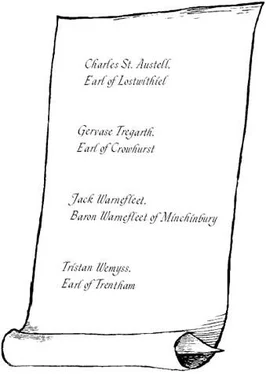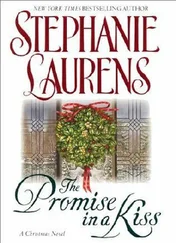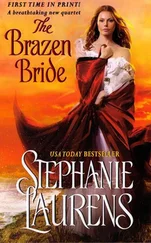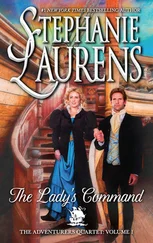




Prologue
The Pavilion, Brighton
October 1815
“His Royal Highness’s straits must be dire indeed if he needs must summon His Britannic Majesty’s best simply to bask in the reflected glory.”
The drawled comment contained more than a little cynicism; Tristan Wemyss, fourth Earl of Trentham, glanced across the stuffy music room, packed with guests, sycophants, and all manner of toadies, at its subject.
Prinny stood in the center of a circle of admirers. Decked out in gold braid and crimson, with epaulets high and fully fringed, their Regent was in genial and expansive good humor, retelling heroic tales of derring-do drawn from the dispatches of recent engagements, most notably that of Waterloo.
Both Tristan and the gentleman standing beside him, Christian Allardyce, Marquess of Dearne, knew the real stories; they had been there. Easing free of the throng, they’d retreated to the side of the opulent chamber to avoid hearing the artful lies.
It was Christian who’d spoken.
“Actually,” Tristan murmured, “I’d viewed tonight more in the nature of a distraction—a feint, if you will.”
Christian raised heavy brows. “Listen to my stories of England’s greatness—don’t worry that the Exchequer’s empty and the people are starving?”
Tristan’s lips quirked downward. “Something like that.”
Dismissing Prinny and his court, Christian surveyed the others crowding the circular room. It was an all-male company primarily composed of representatives from every major regiment and arm of the services recently active; the chamber was a sea of colorful dress uniforms, of braid, polished leather, fur, and even feathers. “Telling that he chose to stage what amounts to a victory reception in Brighton rather than London, don’t you think? I wonder if Dalziel had any say in that?”
“From all I’ve gathered, our Prince is no favorite in London, but it seems our erstwhile commander has taken no chances with those names he volunteered for the guest list tonight.”
“Oh?”
They were talking quietly, out of habit disguising their communication as nothing more than a social exchange between acquaintances. Habit died hard, especially since, until recently, such practices had been vital to staying alive.
Tristan smiled vaguely, indeed through a gentleman who glanced their way; the man decided against intruding. “I saw Deverell at the table—he was seated not far from me. He mentioned that Warnefleet and St. Austell were here, too.”
“You can add Tregarth and Blake—I saw them as I was arriving—” Christian broke off. “Ah, I see. Dalziel has only allowed those of us who have sold out to appear?”
Tristan caught his eye; the smile that was never far from his mobile lips deepened. “Can you imagine Dalziel allowing even Prinny to identify his most secret of secret operatives?”
Christian hid a smile, raised his glass to his lips, and sipped.
Dalziel—he went by no other name or honorific—was the Foreign Office taskmaster who, from his office buried in the depths of Whitehall, managed His British Majesty’s foreign spy network, a network that had been instrumental in handing victory to England and her allies both in the Peninsula campaign and more recently at Waterloo. Together with a certain Lord Whitley, his opposite number in the Home Office, Dalziel was responsible for all covert operations both within England and beyond its borders.
“I didn’t realize Tregarth or Blake were in the same boat as we two, and I know of the others only by repute.” Christian glanced at Tristan. “Are you sure the others are leaving?”
“I know Warnefleet and Blake are, for much the same reasons as we. As for the others, it’s purely conjecture but I can’t see Dalziel compromising an operative of St. Austell’s caliber, or Tregarth’s or Deverell’s for that matter, just to pander to Prinny’s latest whim.”
“True.” Christian again looked out over the sea of heads.
Both he and Tristan were tall, broad-shouldered, and lean, with the honed strength of men used to action, a strength imperfectly concealed by the elegant cut of their evening clothes. Beneath those clothes, both bore the scars of years of active service; although their nails were perfectly manicured, it would be some months yet before the telltale signs of their unusual, often ungentlemanly erstwhile occupation faded from their hands—the calluses, the roughness, the leatherlike palms.
They and their five colleagues known to be present had all served Dalziel and their country for at least a decade, Christian for nearly fifteen years. They’d served in whatever guise had been required, from nobleman to streetsweeper, from clerk to navvy. There had, for them, been only one measure of success—discovering the information they’d been sent behind enemy lines to acquire and surviving long enough to get it back to Dalziel.
Christian sighed, drained his glass. “I’m going to miss it.”
Tristan’s laugh was short. “Aren’t we all?”
“Be that as it may, given that we’re no longer on His Majesty’s payroll”—Christian set his empty glass down on a nearby sideboard—“I fail to see why we need stand here talking, when we could be much more comfortable doing the same elsewhere…” His grey gaze met the eyes of a gentleman clearly considering approaching; the gentleman considered again and turned away. “And without running the risk of having to do the pretty for whichever toady captures us and demands to hear our story.”
Glancing at Tristan, Christian raised a brow. “What say you—shall we adjourn to pleasanter surrounds?”
“By all means.” Tristan handed his empty glass to a passing footman. “Do you have any particular venue in mind?”
“I’ve always been partial to the Ship and Anchor. It has a very cosy snug.”
Tristan inclined his head. “The Ship and Anchor, then. Dare we leave together, do you think?”
Christian’s lips curved. “Heads together, talking earnestly in hushed and urgent tones—if we make for the door unobtrusively but determinedly, I can see no reason we shouldn’t walk straight through.”
They did. Everyone who saw them assumed one had been sent to summon the other for some secret but highly significant purpose; the footmen rushed to get their coats, and then they strode out, into the crisp night.
Both paused, drew in a deep breath, clearing the stultifying stuffiness of the overheated Pavilion from their lungs, then, exchanging faint smiles, they stepped out.
Leaving the Pavilion’s brightly lit entrance, they emerged onto North Street. Turning right, they walked with the relaxed gait of men who knew where they were going toward Brighton Square and the Lanes beyond. Reaching the narrow cobbled ways lined with fishermen’s cottages, they dropped into single file, at every crossroads changing place, eyes always watching, searching the shadows…if either realized, realized they were now at home, at peace, no longer fugitives, no longer at war, neither commented nor tried to suppress the behavior that had become second nature to them both.
Читать дальше

















